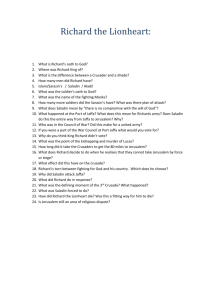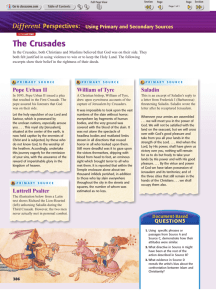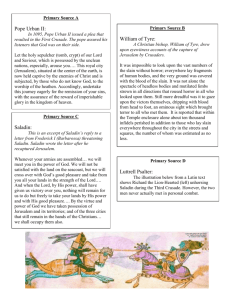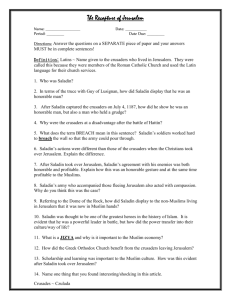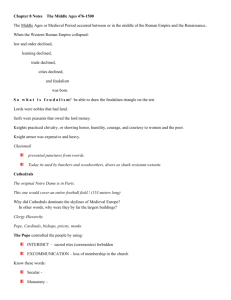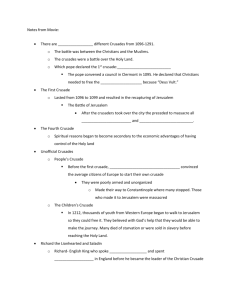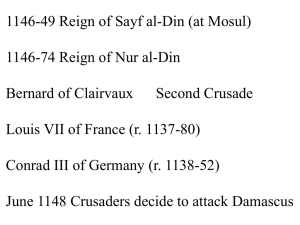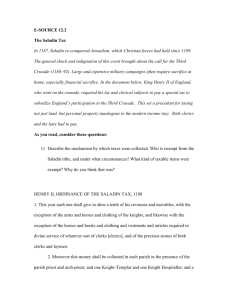The_Lion_and_the_Kin..
advertisement
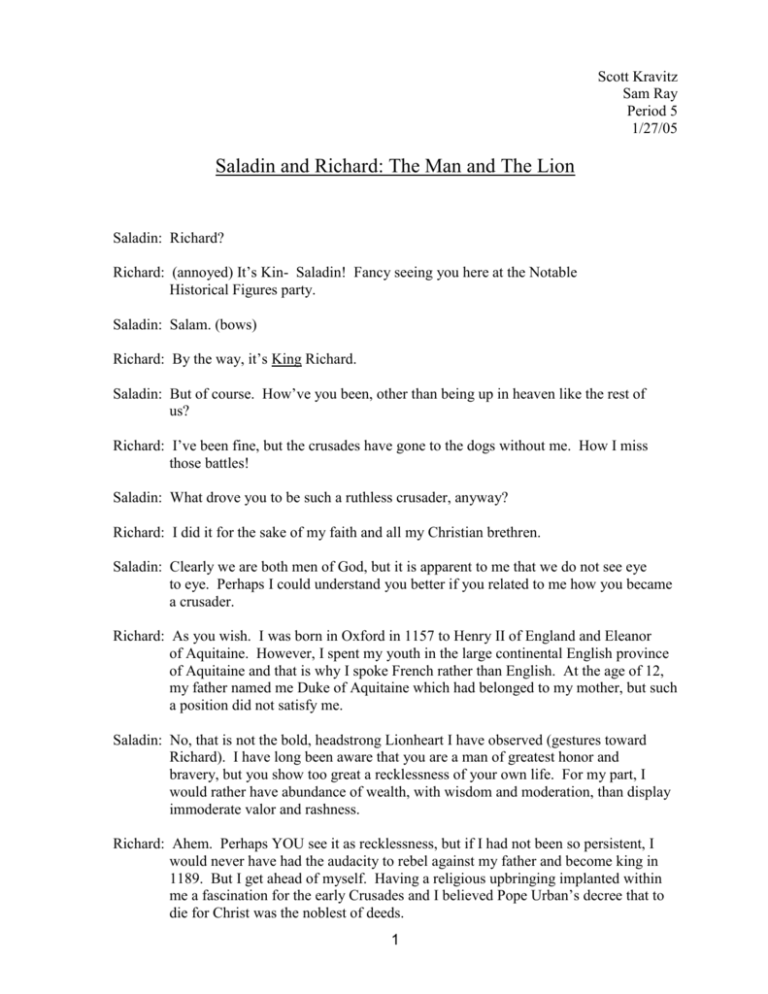
Scott Kravitz Sam Ray Period 5 1/27/05 Saladin and Richard: The Man and The Lion Saladin: Richard? Richard: (annoyed) It’s Kin- Saladin! Fancy seeing you here at the Notable Historical Figures party. Saladin: Salam. (bows) Richard: By the way, it’s King Richard. Saladin: But of course. How’ve you been, other than being up in heaven like the rest of us? Richard: I’ve been fine, but the crusades have gone to the dogs without me. How I miss those battles! Saladin: What drove you to be such a ruthless crusader, anyway? Richard: I did it for the sake of my faith and all my Christian brethren. Saladin: Clearly we are both men of God, but it is apparent to me that we do not see eye to eye. Perhaps I could understand you better if you related to me how you became a crusader. Richard: As you wish. I was born in Oxford in 1157 to Henry II of England and Eleanor of Aquitaine. However, I spent my youth in the large continental English province of Aquitaine and that is why I spoke French rather than English. At the age of 12, my father named me Duke of Aquitaine which had belonged to my mother, but such a position did not satisfy me. Saladin: No, that is not the bold, headstrong Lionheart I have observed (gestures toward Richard). I have long been aware that you are a man of greatest honor and bravery, but you show too great a recklessness of your own life. For my part, I would rather have abundance of wealth, with wisdom and moderation, than display immoderate valor and rashness. Richard: Ahem. Perhaps YOU see it as recklessness, but if I had not been so persistent, I would never have had the audacity to rebel against my father and become king in 1189. But I get ahead of myself. Having a religious upbringing implanted within me a fascination for the early Crusades and I believed Pope Urban’s decree that to die for Christ was the noblest of deeds. 1 Saladin: Ah, now I begin to understand your motives better. Richard: My enthusiasm for battles grew as I fought the numerous barons who threatened England by rebelling. These battles were fought all over the large region of Aquitaine. One such rebellion was at the fortress of Taillebourg, thought to be impregnable because it was surrounded by steep cliffs. It was here that I built my reputation as a fearless leader in battle. Saladin: I suppose you proved them wrong and broke the fortress like a twig. Richard: Aptly put. Yes, and I was so successful that my men thought me invincible. They would follow their fearless leader anywhere. Saladin: A charismatic leader as well. Richard: Once I heard that you and your fellow infidels had taken Jerusalem, I felt it was my duty as a Christian to answer Pope Clement III’s call to crusade. In fact, I was the first monarch to take up the cross for this Third Crusade. I also considered it my privilege as the King to lead my noble troops. En route to Jerusalem, I captured the island of Cyprus and married Queen Berengaria. By then, I had joined forces with France and Austria, ready, no anxious, to do battle. Saladin: Quite an intriguing tale. Richard: Yes…and what about you? What led you back to our Holy City of Jerusalem? Saladin: It was never yours! Need I remind you that your first crusaders took it from us in 1098, after we had inhabited it for centuries, and slaughtered everyone in their path; men, women, and children alike. Richard: I will not apologize for the efforts of those first crusaders! But I am still curious to hear your story. Saladin: Well… I was born in Tikrit, a city in present day Iraq, in 1138, but my story really began when I joined my father and uncle as a Syrian soldier. We laid siege to many of the crusader castles on orders from our Kurdish sovereign, Nur ad-Din. It was here that I learned the art of war, though I was always more interested in religion. In 1164 I was sent to Egypt and in 1171, I abolished the Shiite caliphate and returned Sunni Islam to Egypt. By this time, I was the vizier of Egypt and by 1174, I was Sultan of the Muslim world. Richard: We were both powerful rulers who accepted the responsibility of leadership for the sake of our people and religion. Saladin: In the following years, I spent most of my time working toward my goal of uniting all the Muslim territories. My skills in diplomacy helped me through this time. I gained a reputation as a generous but firm leader, and my devotion to Islam inspired many to join my cause. 2 Richard: Just as your religious fervor inspired Muslims to unite for your cause, so did my skill in battle lead fellow Christians to follow me. Saladin: I then turned my attention toward the Christian Crusaders. In July of 1187, I destroyed an army of crusaders at Hattin and within three months, I overran the cities of Acre, Beirut and even the critically important Ascalon, without much of a fight. And, as you well know, in that same year, 88 years after the bloodthirsty First Crusaders had taken Jerusalem from my Muslim forefathers, I reclaimed the Holy City for Islam. Richard: Yes, it was that loss of Jerusalem that prompted the Third Crusade, uniting forces from throughout Europe. Saladin: And what a force it was! When I received word that an army of crusaders was on its way, led by King Richard, I immediately began to fortify my cities and I even burned down the city of Ascalon in order to prevent you from capturing it and using it against me. Richard: Ah, yes, the glorious alliance between France, England, and Austria was indeed formidable, as it was forged from the brotherhood of Christendom, and with our combined forces we achieved victory, over Acre, that is! And we could have captured Jerusalem, too, if my conniving brother John hadn’t plotted with Philip II of France, that backstabber (draw sword), to take all of my land. If there hadn’t been so many troubles back home in England, I would have stayed and recaptured Jerusalem. Saladin: You had a formidable force, my friend, but because you did not take the time to secure your alliance, you never could have beaten the forces I brought together, especially without Austria and France’s help. Richard: You are undoubtedly right about that. But you must have been impressed by my courageous defense of Ascalon to have sent me one of your best horses as a gift. Saladin: It is true. I could not allow one so great to be overcome by the mere lack of a horse. Richard: As I became ill, unable to fight, you proved to be magnanimous in your proposal of a treaty entitling my Christian brethren to retain the coastal area of Jerusalem and the ability to travel in peace to the holy land in exchange for a five year truce. This truce enabled me to return to England to sort out my domestic affairs. Unfortunately, on my return journey, I was captured by the Duke of Austria and imprisoned for over a year before I could take up my real duties as king. Seven years later, I am embarrassed to admit, I was killed by an arrow wound in a frivolous pursuit of gold at the age of 42. Saladin: I died in 1193, shortly after our treaty, by an illness at the age of 57. I was able to rest in peace knowing I could trust you to keep our treaty, but now that you are no longer in the Holy Land, I worry that our truce will not remain. After all, 3 Reginald of Chatillon twice had broken truces between Muslims and Christians, leading me to begin jihad and eventually recover Jerusalem. But if I were to lose Jerusalem to anyone, I would want it to be someone as courageous as you. Richard: You are a good man, Saladin. I realize now that being a Muslim does not necessarily mean being an infidel. And I see why Muslims now say “Allah, Muhammad, Saladin – God, The Prophet, and The Liberator.” Saladin: As I realize that not all Christians are untrustworthy. Perhaps I should have taken you up on your offer for joint rule of Jerusalem. That way, our peoples could have lived together in peace. Richard: Perhaps so. Unfortunately, even in the twenty-first century, Jerusalem is at the center of religious turmoil. And throughout the Western world, your Muslim term “jihad” is equated with terrorism. Saladin: Ironically so, since “jihad” is, by definition, a defensive concept. The Koran calls upon its believers (opens up Koran to 2:190) “to fight in the Way of God … but aggress not: God loves not the aggressors.” And even though jihad has been used by terrorists to rationalize their murders, no Islamic acts in history have compared to the atrocities committed in the name of Christianity during the Crusades. Richard: I regret deeply that I did not look beyond my own aspirations. Let us hope the future bodes better for our people. Saladin: For all the world. (Pause) Now come, you must try this delicious hummus. (leads Richard off stage) 4 Bibliography Richard I (Scott Kravitz): Biel, Timothy Levi. The Crusades. San Diego, CA: Lucent Books. 1995. Gibb, Christopher. Richard the Lionheart and the Crusades. New York: The Bookwright Press. 1985. Goetz, Philip W. The New Encyclopaedia Britannica. Chicago: Encyclopaedia Britannica, Inc. 1990. History Mole. “King Richard I (1157-1199).” 29 Nov. 2004. http://www.historymole.com/cgi-in/main/results.pl?type=theme&theme=BritRichardI Infoplease. “Richard I.” 29 Nov. 2004. http://www.infoplease.com/ce6/people/A0841801.html Medieval Sourcebook. “Richard the Lionheart Makes Peace with Saladin, 1192.” 16 Nov. 2004. http://www.fordham.edu/halsall/source/1192peace.html. Reston, James, Jr. Warriors of God: Richard the Lionheart and Saladin in the Third Crusade. New York: Doubleday. 2001. Saladin (Sam Ray): Encyclopaedia of the Orient. “Saladin.” 25 Nov. 2004. http://i-cias.com/e.o/saladin.htm History Learning Site. “Saladin.” 25 Nov. 2004 http://www.historylearningsite.co.uk/Saladin.htm Infoplease. “Saladin.” 24 Nov. 2004. http://www.infoplease.com/ce6/people/A0843183.html Lane-Poole, Stanley. Saladin: All-Powerful Sultan and the Uniter of Islam. Cooper Square Publishers. 2002 Medieval Sourcebook. “Richard the Lionheart Makes Peace with Saladin,1192.” 16 Nov. 2004. http://www.fordham.edu/halsall/source/1192peace.html. 5
